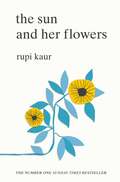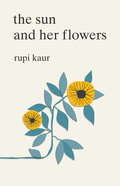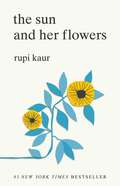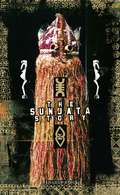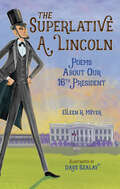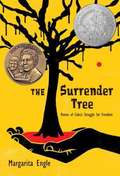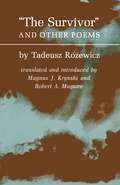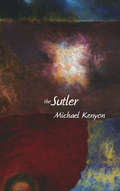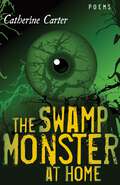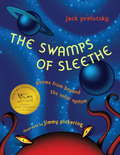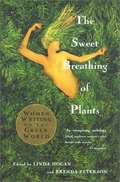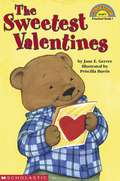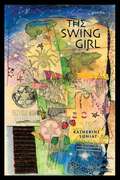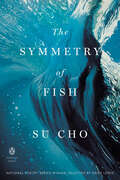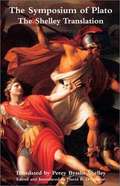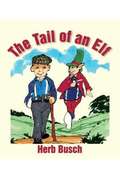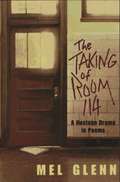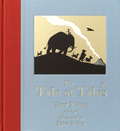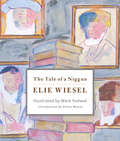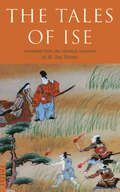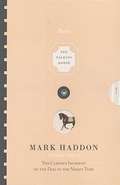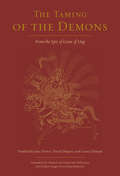- Table View
- List View
The Sun and Her Flowers
by Rupi Kaur<P>From Rupi Kaur, the #1 New York Times bestselling author of milk and honey, comes her long-awaited second collection of poetry. A vibrant and transcendent journey about growth and healing. Ancestry and honoring one’s roots. Expatriation and rising up to find a home within yourself. <P>Divided into five chapters and illustrated by Kaur, the sun and her flowers is a journey of wilting, falling, rooting, rising, and blooming. A celebration of love in all its forms. <P> this is the recipe of life said my mother as she held me in her arms as i wept think of those flowers you plant in the garden each year they will teach you that people too must wilt fall root rise in order to bloom <P><b>A New York Times Bestseller</b>
The Sun and Her Flowers
by Rupi Kaur<P>From Rupi Kaur, the #1 New York Times bestselling author of milk and honey, comes her long-awaited second collection of poetry. A vibrant and transcendent journey about growth and healing. Ancestry and honoring one’s roots. Expatriation and rising up to find a home within yourself. <P>Divided into five chapters and illustrated by Kaur, the sun and her flowers is a journey of wilting, falling, rooting, rising, and blooming. A celebration of love in all its forms. <P> this is the recipe of life said my mother as she held me in her arms as i wept think of those flowers you plant in the garden each year they will teach you that people too must wilt fall root rise in order to bloom <P><b>A New York Times Bestseller</b>
The Sun and Her Flowers
by Rupi Kaur<p>From Rupi Kaur, the #1 New York Times bestselling author of milk and honey, comes her long-awaited second collection of poetry. A vibrant and transcendent journey about growth and healing. Ancestry and honoring one’s roots. Expatriation and rising up to find a home within yourself. <p>Divided into five chapters and illustrated by Kaur, the sun and her flowers is a journey of wilting, falling, rooting, rising, and blooming. A celebration of love in all its forms.</p>
The Sunjata Story
by Bamba Suso Banna KanuteA child is born who will overthrow a king...After the leader of a great African kingdom hears that a baby has been born who will destroy him, he hides behind a mighty army and surrounds himself with magical charms. There remains only one way to kill him.Concealing this secret weakness from the world, the ruler clings to power. But when the sister of his enemy seduces him, lust overwhelms the king. And as he lies beside her in the night, desperate to know her body, he foolishly begins to share his secret...
The Superlative A. Lincoln: Poems About Our 16th President
by Eileen R. MeyerTallest, wisest, most studious--Lincoln was simply superlative!Get to know the personal side of Honest Abe (his LEAST FAVORITE nickname) through fresh and funny poems expressing his superlative nature. Abraham Lincoln is famous for many extremes: he was the TALLEST president, who gave the GREATEST SPEECH and had the STRONGEST conviction. But did you know that he was also the MOST DISTRACTED farmer, the BEST wrestler, and the CRAFTIEST storyteller? Nineteen poems share fascinating stories about events in Lincoln's life, while history notes go even deeper into how he excelled. Don't forget to think of all the ways you, too, are superlative!
The Surrender Tree: Poems of Cuba's Struggle for Freedom
by Margarita EngleIt is 1896. Cuba has fought three wars for independence and still is not free. People have been rounded up in reconcentration camps with too little food and too much illness. Rosa is a nurse, but she dares not go to the camps. So she turns hidden caves into hospitals for those who know how to find her.<P><P> Black, white, Cuban, Spanish—Rosa does her best for everyone. Yet who can heal a country so torn apart by war? Acclaimed poet Margarita Engle has created another breathtaking portrait of Cuba.<P> The Surrender Tree is a 2009 Newbery Honor Book, the winner of the 2009 Pura Belpre Medal for Narrative and the 2009 Bank Street - Claudia Lewis Award, and a 2009 Bank Street - Best Children's Book of the Year.
The Survivors and Other Poems (The Lockert Library of Poetry in Translation #121)
by Tadeusz RozewiczThe description for this book, The Survivors and Other Poems, will be forthcoming.
The Sutler
by Michael KenyonIn language at once simple and eloquent, Michael Kenyon's The Sutler charts a falling and a rising, taking the reader through the grief of a failing relationship to the emergence of new possibility. Each poem is a gentleness deeply felt; each embued with a compassion, an honesty both stark and unflinching. Kenyon’s prose has shown him to be a consummate craftsman, and these poems are proof that he is a remarkable poet.
The Swamp Monster at Home: Poems
by Catherine CarterIn Catherine Carter's The Swamp Monster at Home, classical sirens sing from a Chesapeake Bay island; Adam and his lover, Steve, share beers in Eden; and a Norse goddess strides into an emergency room, "glowing like grain." With quirky imagination and wry humor, Carter exposes the connections between human and nonhuman, blood and home. Building from The Memory of Gills, Carter's debut collection and winner of the Roanoke-Chowan Award for Poetry, these vivid and tender poems consider the immanent and sometimes animistic natural world. The Swamp Monster at Home, however, takes new risks, offering a deeper vulnerability and greater maturity; this new collection acknowledges the loves within and outside of marriage and confesses to both the grief and relief of miscarriage. Varied in form, The Swamp Monster at Home offers accessible and rewarding, elegiac yet hopeful poems-an exciting new collection from a remarkable writer.
The Swamps of Sleethe
by Jack Prelutsky Jimmy PickeringJack Prelutsky's exploration of outer space is not for the faint of heart. No friendly little E.T.-type aliens await your arrival. There are many imaginative ways to perish in these darkly comedic cautionary verses about unexplored worlds so far beyond our solar system. The final poem is an environmental tour de force that packs a wallop. Here are poems the older reader will find great fun to memorize and rattle off to anyone who will listen! And there is a special bonus: anagrams for the kid who loves word puzzles.From the Hardcover edition.
The Sweet Breath of Life: A Poetic Narrative of the African-American Family
by Ntozake Shange Kamoinge WorkshopWords and images come together in a collaboration between celebrated poet Ntozake Shange and an acclaimed group of photographers, to result in this stunning celebration of contemporary Black life in America.From the first publication of The Sweet Flypaper of Life by Langston Hughes and Roy DeCarava in 1967, to Crowns: Portraits of Black Women in Church Hats, collaborations between writers and photographers have been important in African American culture. These books examine the issues of identity and representation that have been so central to this group's efforts to thrive. The Kamoinge Workshop photographers who contributed their work to this inspiring collection consist of names that have appeared in The New York Times, National Geographic, the Museum of Modern Art (MOMA), and more. Names such as Anthony Barboza, Adger W. Cowans, Ming Smith Murray, Beuford Smith, John Pinderhuges, and many others. The Workshop&’s mission was a response from the bias portrayals of African Americans in the media. They sought to shed positive light on their subjects, as well as to demystify Black life in America. And The Sweet Breath of Life does exactly that.
The Sweet Breathing of Plants: Women Writing on the Green World
by Linda Hogan Brenda PetersonA few chapters are: A Passion for Plants--Susan Orlean, Orchid Fever--Sharman Russell, Smelling Like A Rose--Isabel Allen, Ode to Mold--Linda Hasselstrom, Mulch--Zora Neale Hurston, and my favorite: The Language of flowers by Claudia Lewis, in which we learn how the Victorians carried out their love correspondence solely with flowers. This is a fascinating book.
The Sweetest Valentines
by Jane E. GerverThe time was up! Fred's Valentines were not ready for tomorrow! Ah, but Fred finds a sweet solution. This file will make an excellent embossed braille copy.
The Swing Girl: Poems
by Katherine SoniatIn the title poem of The Swing Girl, a Greek burial relic with an image of a small child on her swing suggests the ability to move between present culture and the ghosts of history, between modern metaphor and the rhetoric of myth. Katherine Soniat celebrates this fluidity and the detached yet vulnerable perception that comes with it: "The territory that girl could cover, her eyes peering birdlike / across the grove. The air, a vector."Soniat's new collection contemplates the present through the fragmented lens of history. She swings the reader out across time, to ancient Greece and China, and into the chaos of contemporary war in Serbia and Iraq. The ever-changing point of view disorients, so that ultimately even the daylight overhead seems uncertain: "... the far smear of daylight, granular and moony." Loss provides the substance of history and myth, sounding the dark, minor key of elegy for lives and geographies cracking under pressure.In Soniat's poems the precarious puzzle of this world shatters, only to begin again in startling new ways: "The story of the mountain always points somewhere / else, elusive as the tawny lion disappearing behind / the next high crag."
The Symmetry of Fish (Penguin Poets)
by Su Cho&“All hits no skips. I was incredibly moved by these poems.&” —Roxane Gay, via GoodreadsFrom National Poetry Series winner Su Cho, chosen by Paige Lewis, a debut poetry collection about immigration, memory, and a family&’s lexiconLanguage and lore are at the core of The Symmetry of Fish, a moving debut about coming-of-age in the middle of nowhere. With striking and tender insight, it seeks to give voice to those who have been denied their stories, and examines the way phrases and narratives are passed down through immigrant families—not diluted over time, but distilled into potency over generations. In this way, a family's language is not lost but continuously remade, hitched to new associations, and capable of blooming anew, with the power to cut across space and time to unearth buried memories. The poems in The Symmetry of Fish insist that language is first and foremost a bodily act; even if our minds can't recall a word or a definition, if we trust our mouths, expression will find us—though never quite in the forms we expect.
The Symposium of Plato: The Shelley Translation
by Percy Bysshe Shelley David K. O'ConnorIn the summer of 1818, Percy Bysshe Shelley pulled himself away from a flurry of other projects to devote himself to translating Plato's Symposium. Besides being one of the very great lyric poets of Romanticism, Shelley was an accomplished Hellenist, and had a natural sympathy for Plato's way of seeing the world. The result of his labor was a translation of Plato's principal work on love that is, in both clarity and felicity of expression, unmatched by any contemporary translation.<p><p> Much of what the dialogue offers to today's reader - namely, its invitation to see erotic experience as the privileged locus of our contact with the sacred and the divine - is lost in translation by failures of tone more than by inaccuracies or simple infelicities. The elevation and sophistication of Shelley's prose makes his translation a much better English vehicle for Plato's writing than the rather chatty and colloquial translations current today. Plato's speeches on love need an English idiom in which myth is at home, and in which humor rises to urbanity rather than descending to mere wit and joke. With Shelley, we get a translation of a great literary masterpiece by a writer who is himself a literary master, and his mastery is of exactly the type required by Plato's text.<p> This translation came at the height of Shelley's powers, mirroring in language and conception some of his finest works, and so is itself a precious document in the history of Romanticism, for which the reappropriation of Plato is second in importance only to the massive influence of Shakespeare. Mary Wollstonecraft Shelley, her husband's literary executor, upon publication of (a somewhat expurgated version of) the dialogue, boasted that "Shelley resembled Plato; both taking more delight in the abstract and the ideal than in the special and the tangible. This did not result from imitation; for it was not till Shelley resided in Italy that he made Plato his study. He then translated his Symposium and Ion; and the English language boasts of no more brilliant composition than Plato's Praise of Love translated by Shelley." If this goes too far, it goes at least in the right direction.
The Tail of an Elf
by Herb BuschWhen a man is driven from his office by a series of wrong number phone calls his life is changed for the better when he meets a garishly dressed three foot elf who charms everyone he meets. The tale is told as a light hearted poem.
The Taking of Room 114: A Hostage Drama in Poems
by Mel GlennA series of poems reflect the thoughts of school officials, parents, police, and especially a class of seniors who have been taken hostage by their high school history teacher.
The Tale of the Alerion
by Constance B. Hieatt Guillaume De Machaut Minnette GaudetGuillaume de Machaut, the most important poet and musician of fourteenth-century France, had considerable influence on subsequent generations of writers in both France and England. With this scholarly translation, Minnette Gaudet and Constance B. Hieatt made his longneglected narrative poem, the Dit de l'alerion - a treatise on love and falconry - available to students of medieval literature. In the poem, Machaut defines the problems and pleasures of courtly love by comparing them to those of falconry, a sport which modern readers know little about. The introduction and notes to this edition provide valuable information about the art of falconry, thus clarifying aspects of the poem which might be hard to understand today. The scholarly notes and introduction furnish explications and variant readings of obscure passages and comments on wordplay. A running summary of the contents of the poem is also provided in the margins.
The Tale of Dan De Lion
by Thomas M. DischDan De Lion, a weed in the garden of an autocratic rose fancier, truimphs over the threat of extinction in this fable of the ordinary man confronting power and ruthlessness. In the tradition of Lewis Carroll and Edward Gorey, Thomas M. Disch characterizes his rakish dandelions and pampered roses with a combination of humor and philosophical insight. Wry illustrations by Rhonda McClun bring the snooty roses and "lower-dass" dandelions to full flower.
The Tale of Tales
by Tony MittonA new offering by award-winning poet Tony Mitton, beautifully illustrated by Peter Bailey. Short installments comprise The Tale of Tales, the story of a group of animals making their way to Volcano Valley to hear the Tale of Tales, the greatest story ever told. Along the way, the animals meet new travelers and each shares his own story with the group. This delightful story, filled with humor and warmth, and charmingly illustrated throughout with line drawings, is sure to become a favorite for reading aloud, as well as for newly independent readers.
The Tale of a Niggun
by Elie WieselElie Wiesel&’s heartbreaking narrative poem about history, immortality, and the power of song, accompanied by magnificent full-color illustrations by award-winning artist Mark Podwal. Based on an actual event that occurred during World War II. It is the evening before the holiday of Purim, and the Nazis have given the ghetto&’s leaders twenty-four hours to turn over ten Jews to be hanged to &“avenge&” the deaths of the ten sons of Haman, the villain of the Purim story, which celebrates the triumph of the Jews of Persia over potential genocide some 2,400 years ago. If the leaders refuse, the entire ghetto will be liquidated. Terrified, they go to the ghetto&’s rabbi for advice; he tells them to return the next morning. Over the course of the night the rabbi calls up the spirits of legendary rabbis from centuries past for advice on what to do, but no one can give him a satisfactory answer. The eighteenth-century mystic and founder of Hasidism, the Baal Shem Tov, tries to intercede with God by singing a niggun—a wordless, joyful melody with the power to break the chains of evil. The next evening, when no volunteers step forward, the ghetto&’s residents are informed that in an hour they will all be killed. As the minutes tick by, the ghetto&’s rabbi teaches his assembled community the song that the Baal Shem Tov had sung the night before. And then the voices of these men, women, and children soar to the heavens. How can the heavens not hear?
The Tales of Ise
by H. Jay HarrisRevered as one of the great literary classics of Japan,The Tales of Ise is an anonymous tenth-century collection of Japanese poems and prose. First published in 1608 as Ise-monogatori, the work is a product of court life in which the romantic assignations, intrigues, and social standards of aristocratic society in ancient Japan are vividly revealed.Each of the 125 episodes in the book consists of a story plus poetry in the uta form(five lines totaling thirty-one syllables) following the life of a nameless hero, who embodies the social ideals of the era, from his "coming of age" to his death.
The Talking Horse and the Sad Girl and the Village Under the Sea: Poems
by Mark HaddonThat Mark Haddon's first book after The Curious Incident of the Dog in the Night-Time is a book of poetry will perhaps come as a surprise to his legions of fans; that it is also one of such virtuosity and range will simply astonish them. The Talking Horse and the Sad Girl and the Village Under the Sea reveals a poet of great versatility and formal talent: all the gifts so admired in Haddon's prose are in strong evidence here--the humanity of his voices, the dark humour and the uncanny ventriloquism but Haddon is also a writer of considerable seriousness, lyric power and surreal invention. Here are bittersweet love-lyrics, lucid and bold new versions of Horace, comic set-pieces, lullabies, wry postmodern shenanigans (including a note from the official board of censors on "18" certificate poetry), and an entire John Buchan novel condensed to five pages. The Talking Horse and the Sad Girl and the Village Under the Sea will consolidate his reputation as our most powerful myth-weavers and spell-makers, as well as one of the most outrageous and freewheeling imaginations at work in contemporary literature.
The Taming of the Demons: From the Epic of Gesar
by David Shapiro Lama Chonam Jane Hawes H.H. the Fourteenth Dalai Lama Dudjom Sangye Pema ShepaA newly translated volume of the centuries-old spiritual epic of King Gesar.For centuries, the epic tale of Gesar of Ling has been told across Asia. This epic is a living oral tradition, performed widely by singers and bards and beloved especially in Tibet. Considered the longest single piece of literature in the world canon, the epic of Gesar chronicles the legend of King Gesar of Ling, a heroic figure known for his fearless leadership. The epic encompasses some 120 volumes and nearly 20 million words, and there are numerous versions across cultures.This book is the first English translation of the fourth volume of this sweeping literary work, with stories from after Gesar's coronation to the throne of Ling. This volume focuses on battles won and strategies applied, as the warrior-king Gesar fended off demons and liberated his foes. Though largely a violent account focused on his superhuman prowess in battle, this volume is rich with ethical proverbs that inform Tibetan culture to this day. A significant work of legend, the epic of Gesar is also a vital part of Tibetan Buddhism, as Gesar is said to have been chosen by celestial beings to restore order and destroy anti-Buddhist forces.The epic of Gesar is the cultural touchstone of Tibet, analogous to the Iliad or the Odyssey. While Book One covers Gesar's birth, youth, and rise to power, this volume recounts the martial victories and magical feats that made him a legendary figure to so many.
